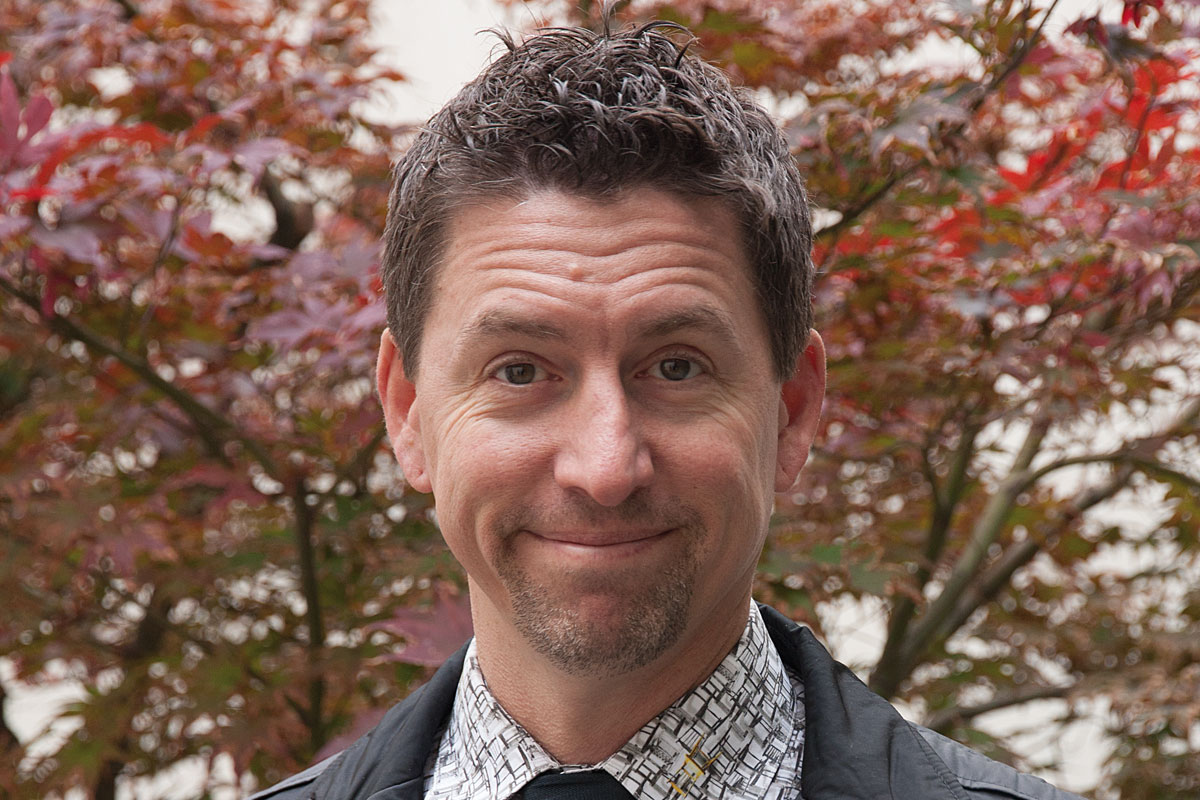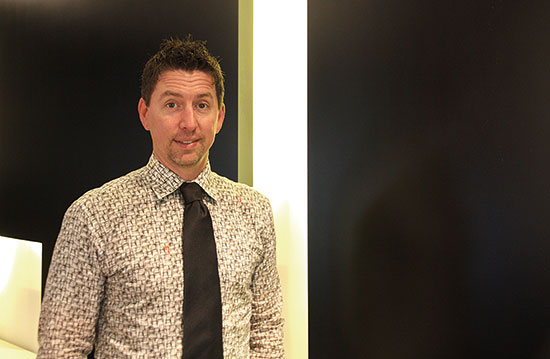Interview with Maxwell Boykoff
«We need to consider communication to be part of our core set of responsibilities»
Associate Professor in the Center for Science and Technology Policy at the University of Colorado-Boulder (USA)

Climate change is one of the most important scientific challenges of our society today, ever-present in the pages and covers of newspapers. Its social and economic impact on our daily lives, as well as controversies like the so-called Climategate or related to contrarian or skeptic positions, make it a very compelling subject for the media. Consequently, this has been one of the most prosperous research areas within the field of science communication. Articles on the reception, media coverage or public discourse on climate change are already common in scientific journals such as Public Understanding of Science or Science Communication, as well as in other general communication journals. Professor Maxwell Boykoff is one of the most renowned researchers in this field. He is currently a professor at the Center for Science and Technology Policy Research of the University of Colorado Boulder, in the U.S.A., and the author of numerous studies on the perception and communication of climate change. In 2011 he published the book Who Speaks for the Climate? Making Sense of Media Reporting on Climate Change, where he collects more than ten years worth of work.
We met Professor Boykoff in Pamplona, where he was to open the International Conference on Communication, organized by the University of Navarra. In its latest edition, the conference was devoted to the communication of climate change and the environment. He came to Spain with his son, who stayed patiently with us throughout the interview. While the boy worked on his homework without paying much attention to his father, Maxwell Boykoff speaks in a slow, soft voice about climate change, media and the perception of science.
«Climate change and its challenges intersect with politics, with economics, with society, and that those make compelling stories»
Why do you think climate change is so much more discussed in the media than other environmental problems?
Really, over the last couple of decades that’s been increasingly recognized. That climate change science, policy decision-making, cut right to the heart of the way we live our everyday lives. So the ways in which we perceive other challenges certainly relate to climate challenges. I think because of that recognition it has grown since it started to get consistent coverage in the 1980s, and it seemed to be a pivotal issue that gets taken up through media accounts to address a variety of connected challenges. I do think that there are many things that make it a difficult issue to cover, and so the fact that it’s just covered alone isn’t necessarily a success to raise awareness about climate change. But it’s a very complex issue with many different dimensions and so once the reporter, journalist or news organization decides to cover it, that’s just the beginning of the communication challenge.
Then, the fact that climate change is present in the media does not necessarily mean there is a growing interest in it?
Well, I think there could be some of them that are driven by environmental concern in and of itself, but I think that there are many other elements at play as well. Some of them being the perception of editors, as addressing them can be one of the most pertinent and pressing issues of our time, could be related issues around what the editors, what the reporters see as responding to the interest of their audiences. And it could also be the ways in which climate change and some of the ways that we see these challenges that intersect with politics, with economics, with society, and that those make compelling stories.
Do you think there is sensationalism in media coverage of climate change?
There can be, certainly. The work that I’ve done now over the last decade or so has traced places where recording has been done accurately, responsibly, fairly, but there are also places where it has been sensationalized in certain cases. Now this cuts both ways, there are many ways in which one can sensationalize a climate story depending upon which aspect of climate change is being addressed. The work that I do picks up on the patterns, the trends that emerge once we look at coverage over longer periods of time. I think that it can be a useful way in, to point out one particular piece and maybe how that’s been sensationalized, but until you take that more systematic, long-term approach, those remain mere anecdotes.
Do you think there are important differences in climate change coverage between the USA and Europe?
Well, again, there are many different ways in which we ought to be thinking about the climate issue, and so if we take, for example, coverage of whether humans contribute to climate change, these are questions that get kind of different responses through media outlets and so, take in the United States, for example, the ways in which it is constructed, there are certain places that are receptive to questioning about this human role in climate change, and so there have been patterns of dissent, if you will, or contrarianism within the opinion pages of the Wall Street Journal, there have been pockets of contrarianism that is consistently perpetrated through a television news channel in the United States, Fox News; whereas in the UK we see a very different picture where there is a great deal of accurate, fair reporting on the convergent agreement within the science community.

Anna Mateu
Why do these differences in the way to understand climate change exist?
There are a few aspects that come to mind. One is that we have to recognize the large political economy states that are involved that emanate from the United States, in particular the carbon-based industry and society is very much wrapped up, not just in the economy, through carbon-based industry, energy organizations, but then also through the politics that give them the structure. In US politics there’s a great deal of lobbying efforts, a great deal of special interest influence in the politics and policymaking. But the second element, so beyond political economy or connected to it, are cultural issues, and in our cultural history in the United States, there have been these anti-regulatory stances that map onto right of center ideologies, that have been pro-privatization, movements that have mapped onto anti-environmentalist stances, we have seen this over the years, through certain right of center movements like the wise use movement in the United States. As we move forward into the present time, this cultural elements that play into how some of these resistances, some of the ways in which it’s voiced, this contrarian view through the media, has on the public. So it’s a combination of cultural elements along with political economy in the United States that makes it a bit of a toxic mix for outlier perspectives to be amplified through media accounts.
Do you think there is a lacking of science knowledge to understand science problems such as this one?
Yes and no. Sure, in a perfect world, better science literacy, better literacy in climate change, would help this situation, but it does not seem to be the necessary pathway to build better understanding and engagement. Of course we want there to be a balance between meeting people where they are and guiding them into new ways of thinking and acting in relation to environmental challenges, but one of the failings of the last decades, one that has been well documented within science and technology studies, has been that reliance upon scientific knowledge is a way of enhance decision-making as part of this larger complex in dynamic set of issues.
Because you say that more media coverage does not equal more knowledge about these issues.
That’s right. So you could maybe make the connection to ‘signal to noise’, in detecting the human fingerprint in climate change and attributing it to human activities That there’s a lot of noise in the system. That more media coverage, if it’s not done accurately, responsibly, constructively, it’s just more noise in the system. Signal to help people make better decisions, to raise their awareness, may not always be there.
«When I discuss the shortcomings of media representations of climate change, oftentimes there can be a focus on journalists. But really, this can come back to the scientists themselves»
What is the situation with climate change skeptics? Have they also been enlarged by the media?
The work that I’ve done now over the last few years was interviewing some key members of the contrarian community, and observing some of the key meetings that take place that attract these contrarian discourses. I worked with colleagues like Robert Brulle at the Drexel University, with Shawn Olsen who is now in Utah State. We’ve been able to document the frequency of their stances and how they’ve been tracked through the media, and certainly there has been this amplified attention that’s been paid to other very much outlier perspectives within relevant expert communities working on these issues.
In this sense, what is the role of new media, digital media or social media, towards skeptic positions? Do they amplify these stances?
They can [amplify them] at times, certainly. So, looking at it, there’s the case of many contrarian voices grabbing hold of the means of production through new and social media, through blogging. There are a number of prominent blog sites, like Climate Depot, like Watts Up With That. But then, voicing these dissenting contrarian views through the media, they have amplified their voices by grabbing hold of those means of production. Yet I also think the democratization impulse that’s involved with new social digital media, where more people are content producers, helps in the public deliberation around what to do about various climate challenges. At the same time, though, when dealing with an expert-driven evidentiary issue like climate change, pulling that set of considerations and deliberations into a place where many people can have an opinion or a belief, they may serve to pollute our ability to deal and address these issues..
«Voicing dissenting contrarian views through the media, they have amplified their voices. Yet I also think the democratization impulse of social media helps in what to do about climate challenges»
In Mètode, we created the Two Cultures Observatory to study the interactions between science and the press, based on the concept by C. P. Snow. What do you think is the state of this interaction between science and the press?
I think there’s still a long way to go. This has changed a lot, in that I don’t think we can consider them so much as binaries anymore. Communication scholar Matthew Nisbet at American University talks about that in terms of four cultures. But that said, there are many challenges that remain, among them climate scientists, particularly research academics more probably working on these issues, need to take a great deal more time to smarten up their language, to better communicate effectively and provide resonance to what they’re saying. So it’s an art, and there have been some folks over the years that have done it very well, and we need to, as a community, look to some lessons that could come from leaders in the field, such as the late Steve Schneider, who was a brilliant climate scientist and an outstanding climate communicator. Instead, when we get busy in our everyday lives just like everybody else, different academic researchers and climate scientists think that reporting their findings, communicating their findings is somewhat of an afterthought, that is an extension of their research that’s is in the lab, this is in the field. That’s a mistake. To integrate that, we consider it to be part of our core set of responsibilities. It’s what will help us smarten up our communications to, say, other cultures, if you will through C. P Snow, through media actors to the public. And so, oftentimes, when I discuss some of the shortcomings of media representations of climate change and we talk about communications around climate change, oftentimes there can be a focus on how different journalists, editors, other media actors are coming up short. But really, this is a big issue that can come back to the scientists themselves. Therefore, as media consumers, we don’t have the access to the top perspectives and the top researchers who are interpreting these complex issues for us. We suffer in terms of the ways in which we can try and make sense of this through media accounts.





